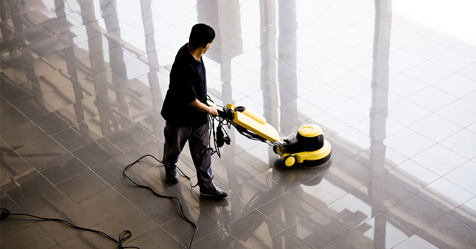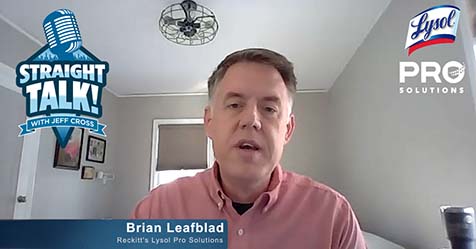Grocery store chains go back and forth on how they handle their floor care needs.
Some purchase their own equipment and have their staffs maintain the store’s floors; others turn it over to a building service contractor (BSC).
Often, what happens is a combination of the two: The store’s employees do some floor maintenance during the course of the day, typically sweeping and mopping, while the BSC is in charge of the actual floor scrubbing, cleaning and polishing in the evening.
This is a similar procedure followed at other types of retail outlets such as big box wholesalers, electronics stores and the like.
And, as many BSCs know, floor care for these types of facilities is often conducted in what is known as a “locked-in” situation.
The cleaning workers may actually be locked in the store for the evening while they perform their floor care duties.
While this may sound uncomfortable, maintaining the floors at grocery and large retail outlet stores can be very lucrative and, in many parts of North America, these are widely sought-after customers for BSCs.
Many contractors specialize in providing floor care services to these types of customers.
However, BSCs should know that floor care in grocery and retail stores, just as in other types of facilities, has changed quite a bit in the past decade.
Mainly, this is due to the type of floor coverings now readily available and commonly installed.
At one time, vinyl tile was the flooring of choice in grocery stores; today, it is not uncommon to see floors comprised of terrazzo, ceramic tile, stained concrete, hardwood or manmade wood in a grocery store.
While there are similarities as to how these floors are maintained, there can also be major differences.
Because of this, a prudent cleaning contractor should make sure he or she knows how the floor covering manufacturer suggests the floor be cared for and follow those guidelines to the best of their abilities.
Cleanup In Aisle Three
No matter what type is installed, a key concern when caring for the floors in grocery and large retail stores is to be aware of the importance of floor safety.
The vast majority of accidents in grocery stores — those potentially posing physical harm to shoppers or staffs — are of the slip-and-fall nature.
It is estimated that slip-and-fall accidents amount to as much as $200 million annually per grocery store chain — sometimes more.
Many slip-and-fall accidents in grocery stores are actually caused by shoppers and employees during the course of the shopping day.
Often, food or produce is dropped, liquids are spilled, refrigeration cases leak and a host of other substances wind up on the floor.
If these hazards are not cleaned up as soon as possible, they become a slip-and-fall accident just waiting to happen.
For this reason, BSCs are encouraged to have their clients conduct floor inspections throughout the day.
Inspections should be documented as to when they were conducted, which areas of the store and by whom.
It is not uncommon to find that many floor hazards involve the same floor areas, and some hazards may even materialize around the same times each day.
For instance, vegetable and produce kiosks are frequent problem areas to the point that many grocery stores now install matting systems in these spaces to help promote safety and reduce necessary cleaning loads.
Interestingly, not only are more floor hazards likely in the early evening when people are leaving work and running errands, but an increase may also be noted shortly after school lets out and students rush to the store to buy drinks and snacks.
I mentioned earlier that there are now many types of floors installed in grocery stores; some are finished, while others are not.
If a finish is applied, the floor covering manufacturer or installer will often recommend the type of finish that will work best with the floor.
A key concern for the BSC is that the finish selected be durable and have a coefficient of friction (COF) of 0.5 or higher, which ensures that the floor is designed to help prevent slip-and-fall accidents.
Further peace of mind and confidence in the product will be had if the finish has been certified by the National Floor Safety Institute (NFSI).
NFSI certification verifies that the finish has been independently tested and proven to meet certain standards and criteria to help promote floor safety.
The Tool Of Choice For Night Owls
Most of the actual maintenance of grocery and retail store floors occurs late at night, and the machine most often used to clean these floors is an automatic scrubber — abbreviated and accepted by many simply as autoscrubber.
Autoscrubbers “lay down” cleaning solution, agitate or scrub it into the floor and then vacuum up the solution, moisture and soils.
Because labor is the major expense in floor care — estimated at more than 70 percent of the total operational costs — the size of the machine is important.
Too small a machine will be time-consuming and require additional passes to clean walkways; too large a machine may not be able to clean certain floor areas, which often means these areas must be then cleaned manually — a much slower and costlier process.
When selecting an autoscrubber, look for these features:
- A battery-operated machine that eliminates cords and can offer up to four hours of operation on one charge
- A self-propelled system that can go forward and backward
- A multistage vacuum motor to more thoroughly vacuum up waste and slurry
- Large recovery and solution tanks
- Easy access to batteries and mechanicals, although any major servicing should always be handled by a qualified repair professional.
A good autoscrubber should be able to clean as much as 20,000 square feet per hour.
Very often, BSCs bid on grocery and retail store accounts based on the square footage of the facility, similar to how carpet cleaning is charged.
When this is the case, the more floor area the autoscrubber can clean, the faster the job can be completed.
And, since time is literally money for BSCs, completing floor care tasks more quickly and effectively can make every account more lucrative.



